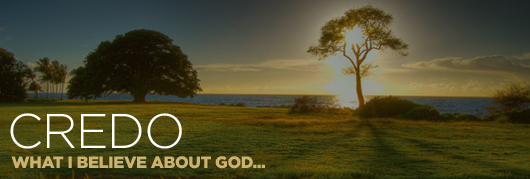
This post is part of the Credo Blog Series. For some basic information about the series, go here. Photo Credit.
I believe in one mighty and all-powerful God, creator of the heavens and the earth and everything in them. God is Good and God is love. “Give thanks to the Lord, for he is good; his love endures forever†(Psalm 118:1). God is all-knowing (omniscient), all-present (omnipresent) and all-powerful (omnipotent). God is perfectly just, and his ways are pure, holy and righteous. “For my thoughts are not your thoughts, neither are your ways my ways†(Isaiah 55:8). God is sovereign and in total and absolute control over everything in his creation. God is holy and worthy of all glory and honor and praise forever and ever.
In December of 2000 – this is how I summed up my beliefs concerning God. Looking over this statement, there are a couple things that stand out to me, but I don’t know that my core beliefs about God have changed too much since 2000. I do believe that God is the creative, creator God. I do believe that at God’s very core, God is good and God is pure love. Psalm 118:1 sums it up quite nicely: “God’s love endures forever.”
However, I had to chuckle a bit when I started throwing out all the omni- words in the next sentence. It reminded me of this line in Jake Bouma’s Sovereignty of God post: “I’ll try my best to avoid theological jargon, especially words beginning with omni-.” In some sense, yes, words like these do help to communicate some of our core ideas – but they also certainly fail to totally be able to describe who God is. Of course, the part of me that leans more toward open-theism or even some process theology might question the idea that God is totally and perfectly all-knowing, but in the end, any language and words we use fail to describe the creator God.
I think the use of Isaiah 55:8 is both appropriate and borderline cliché: it seems to be one of those verses people always throw out when bad things happen to people and they are trying to comfort them. Someone’s child dies unexpectedly – “Well, God’s ways are not always our ways…” This use of this verse (and any scripture) shows a real lack of pastoral care, but I can understand the reasoning behind it. And in the end…it’s true that God IS going to work in ways that we cannot understand, and we can never fully know the mind of God. So, while it has the potential to be misused, I think I would still probably incorporate some of this idea in a 2009 Credo of what I believe.
My second to last line is pretty clear about where I stand on the issue of God’s sovereignty – and it’s a little different from where I came down in this post. Far be it from me to try and pinpoint the level of sovereignty to which God acts and lives in this world – but I wouldn’t use words like “total” and “absolute control.” While I do believe that God, as creator and sustainer of God’s creation, could exercise total and absolute control if God wanted to – I don’t believe that’s the way in which God has chosen to interact with God’s creation.
I think the overwhelming thing I noticed when reading my Credo on God from 2000 was that it didn’t leave much room for what we don’t know about God. Almost all the statements began, “God is…” and seemed to be very definitive. They say that when people graduate from seminary, they generally end up leaving with more questions than answers (and I think that’s probably the mark of a good seminary education) – which was definitely true for me. I also left seminary with a strong pulling towards apophatic/negative theology. It’s not that I think we’re unable to make ANY positive affirmations of who God is – it’s just that I think we need probably make less, and make them with a spirit of humility.
Credo 2009: God
I believe in a very big God. A God who cannot be confined or defined. A God who has been active throughout history from God’s initial encounters with God’s people, Israel, to God’s encounters with each and every person today. This God is a passionate God – one who deeply cares for God’s creation and desires a relationship with creation. This relationship isn’t one marked by absolutes and total control (as perhaps I once thought) – but is more an organic, living relationship – a relationship of give-and-take. As is clear from scripture, God’s mind can be changed…we can change God and God can change us.
It’s not so much that God “needs” us – but I think God chooses to “need” us in a way – God chooses to partner with us in the world today. We partner with God to become co-creators, and through that partnership, we help to bring about a future that is filled with hope, grace and love.